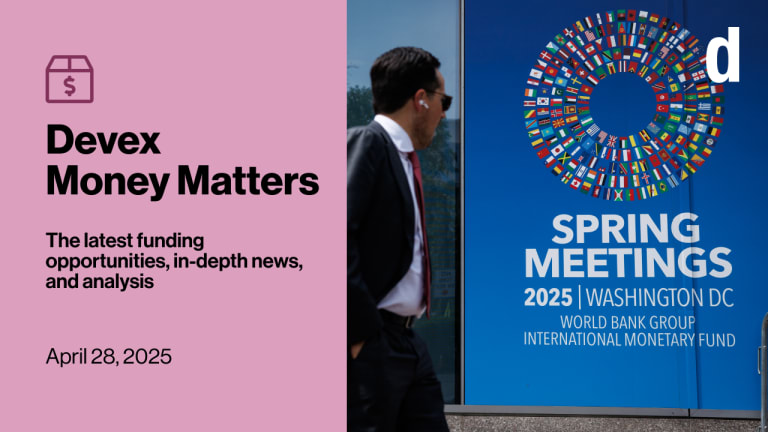
Allegations of wrongdoing. An independent investigation. A chief executive on administrative leave. That’s where things stand today with a major impact-investing initiative of the United Nations Office for Project Services, according to an investigation by Ilya Gridneff for Devex.
This is a preview of Devex Invested
Sign up to this weekly newsletter inside business, finance, and the SDGs, in your inbox every Tuesday.
With one former UNOPS official describing the agency’s senior leadership as “a corrupt cabal,” there’s definitely cause for concern. And this is not the first time that a big impact-investing venture has been plagued with problems. I’ll be watching to see if the accountability mechanisms in place prevent harm in this case and how much of a setback it might be for similar initiatives.
• The Sustainable Investments in Infrastructure and Innovation, or S3i, initiative was launched to de-risk and attract private investment in infrastructure projects in developing and emerging economies.
• In 2018, Ghanaian President Nana Akufo-Addo said a plan to build 100,000 affordable, sustainable, and environmentally sound homes through S3i was “ushering into existence a new dawn for Ghana and our citizens.” Similar plans were announced in India, Guinea, the Caribbean, Pakistan, and Nigeria.
• The initiative would eventually invest $63 million — including tens of millions of dollars in loans to Singapore-based SHS Holdings, a primary contractor for S3i — to build more than 1 million homes. But the company had no previous experience delivering projects of this size or scope. The circumstances around UNOPS’ loans to SHS Holdings are now part of an independent investigation by the U.N. Office of Internal Oversight Services.
• At the center of that probe is S3i Chief Executive Vitaly Vanshelboim, who oversaw the initiative’s lending to SHS Holdings and is now on administrative leave. His boss, UNOPS Executive Director Grete Faremo — who is not currently under investigation — announced her retirement in March, though a senior U.N. official tells Devex she was asked to resign.
• Today, the entire initiative is stalled, UNOPS is owed tens of millions of dollars, and no houses have been built. Finland, where S3i is based, has suspended funding the initiative amid the U.N. investigation. On Sunday, UNOPS said that it “takes all allegations of wrongdoing extremely seriously” and that “appropriate disciplinary and corrective actions” will follow if any are confirmed. “S3i funds are at risk, but to date, no funds have been lost, and UNOPS will pursue all available legal remedies to protect its operations and assets,” it added.
Read: What went wrong with UNOPS’ ambitious impact-investing initiative?
Happy birthday, Devex Invested
It’s hard to believe — for me, at least — that a year has passed since we launched Devex Invested. Thank you for being part of that journey. As we look ahead, we want your input on how to improve this newsletter. Please take a few minutes to fill out our short survey.
Will ‘messy’ politics dominate?
High-level dignitaries and their entourages are descending on Washington, D.C. this week for the Spring Meetings of the World Bank and International Monetary Fund, but almost everything will take place behind closed doors. My colleague Shabtai Gold, who is covering the gathering, gives us a glimpse at what’s likely to dominate the conversations.
The war in Ukraine is not officially on the agenda but will likely overshadow many of the discussions. Rising food prices are expected to be another key issue, with U.S. Treasury Secretary Janet Yellen saying much of her department's work will focus on better supporting “developing countries as they weather these shocks.”
Also on the agenda: The pandemic, debt, climate change, and global cooperation. G-20 ministers are scheduled to meet, but politics around Ukraine are likely to make for a “messy” week, a former U.S. government official said during a briefing.
On Monday, IMF said it plans to operationalize its new Resilience and Sustainability Trust by October, and officials said that they expect some donors to announce significant contributions during the Spring Meetings, Shabtai reports. Meanwhile, the World Bank lowered its global growth forecast for this year, and President David Malpass told reporters that mounting problems had pushed the bank to target a new emergency financing window of $170 billion for the world’s lowest-income countries.
Read: IMF aims to operationalize new RST fund by October
Plus: World Bank lowers growth outlook, eyes $170B emergency funding
What’s with ODA?
The Organisation for Economic Co-operation and Development released preliminary data on 2021 official development assistance that showed total aid spending by Development Assistance Committee members has increased by 4.4%, to $178.9 billion. But before you rejoice: Much of that was driven by COVID-19 response efforts — and if money spent on vaccines is excluded, ODA grew by only 0.6%.
Funding insights: Which countries spent the most on aid in 2021 (Pro)
+ Want to uncover funding opportunities and get early insights on funding activities? Start your five-day free trial of a Pro Funding subscription. Or if you're part of an organization that can benefit from these, sign up or upgrade to Devex Pro Funding for Organizations.
Push pause
The World Bank has approved a $300 million grant for Ethiopia to support people’s needs as they face the effects of conflict in the country. But not everyone is thrilled with the decision, my colleagues Vince Chadwick and Shabtai report. A spokesperson for the European Commission tells Devex that the move is “premature” and potentially “counterproductive” to the nascent peace process.
European Commission: $300M World Bank grant to Ethiopia ‘premature’
What we’re reading
World Bank to tap $1.5B more for Ukraine, mostly from IDA fund. [Devex]
Russia’s invasion of Ukraine is changing ESG investing. [MarketWatch]
Yes, investing in ESG pays off. [Harvard Business Review]
The case for financing conservation of coastal waters. [Devex]





